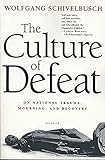Culture of defeat on national trauma, mourning and recovery
Material type: TextLanguage: English Original language: German Publication details: New York Metropolitan Books 2003Description: 403p. 25 cmISBN:
TextLanguage: English Original language: German Publication details: New York Metropolitan Books 2003Description: 403p. 25 cmISBN: - 9780312423193
- Kultur der Niederlage. English
- Franco-Prussian War, 1870-1871 -- Psychological aspects
- World War, 1914-1918 -- Psychological aspects
- World War, 1914-1918 -- Germany
- Defeat (Psychology) -- Case studies
- National characteristics -- Case studies
- Military history, Modern -- Case studies
- United States -- History -- Civil War, 1861-1865 -- Psychological aspects
- Southern States -- Social conditions -- 1865-1945
- France -- Social conditions -- 19th century
- Germany -- Social conditions -- 1918-1933
- 303.66 22 SC-C
- E468.9 .S3513 2003
 Print
Print
| Item type | Home library | Collection | Call number | Status | Date due | Barcode | |
|---|---|---|---|---|---|---|---|
 Print
Print
|
OPJGU Sonepat- Campus Main Library | General Books | 303.66 SC-C (Browse shelf(Opens below)) | Available | 118067 |
Includes bibliographical references (p. [295]-391) and index.
"History may be written by the victors, Wolfgang Schivelbusch argues in his new book, but the losers often have the final word. Focusing on three seminal cases of defeat - the South after the Civil War, France in the wake of the Franco-Prussian War, and Germany following World War I - Schivelbusch reveals the complex psychological and cultural responses of vanquished nations to the experience of military defeat.".
"Drawing on reaction from every level of society, Schivelbusch investigates the sixty-year period in which the world moved from regional to global conflagration, and from gentlemanly conduct of war to total mutual destruction. He shows how conquered societies question the foundations of their identities and strive to emulate the victors: the South to become a "better North," the French to militarize their schools on the Prussian model, the Germans to adopt all things American.
He charts the losers' paradoxical equation of military failure with cultural superiority as they generate myths to glorify their pasts and explain their losses: the nostalgic "plantation legend" after the collapse of the Confederacy, the new cult of Joan of Arc in vanquished France, the fiction of the stab in the back by "foreign" elements in postwar Germany.
From cathartic epidemics of "dance-madness" to the revolutions that so often follow battlefield humiliation, Schivelbusch finds remarkable similarities across cultures."--BOOK JACKET.
There are no comments on this title.

